TPO12 lecture词汇
TPO_1-23学术听力词汇整理资料
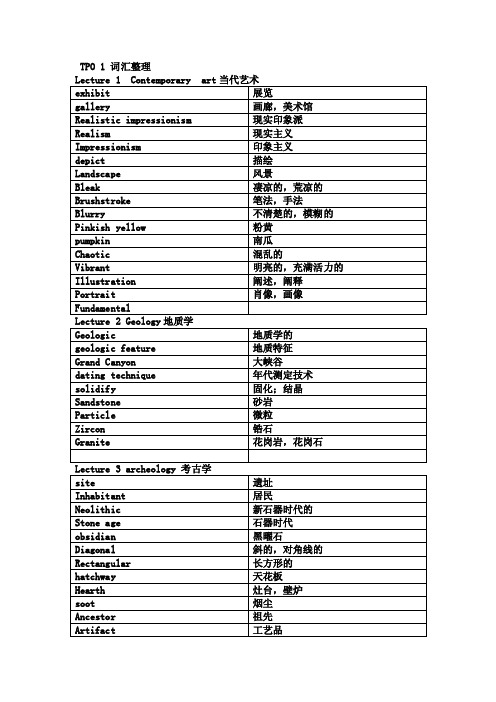
TPO 1 词汇整理Lecture 1 Contemporary art当代艺术exhibit 展览gallery 画廊,美术馆Realistic impressionism 现实印象派Realism 现实主义Impressionism 印象主义depict 描绘Landscape 风景Bleak 凄凉的,荒凉的Brushstroke 笔法,手法Blurry 不清楚的,模糊的Pinkish yellow 粉黄pumpkin 南瓜Chaotic 混乱的Vibrant 明亮的,充满活力的Illustration 阐述,阐释Portrait 肖像,画像FundamentalLecture 2 Geology地质学Geologic 地质学的geologic feature 地质特征Grand Canyon 大峡谷dating technique 年代测定技术solidify 固化;结晶Sandstone 砂岩Particle 微粒Zircon 锆石Granite 花岗岩,花岗石Lecture 3 archeology 考古学site 遗址Inhabitant 居民Neolithic 新石器时代的Stone age 石器时代obsidian 黑曜石Diagonal 斜的,对角线的Rectangular 长方形的hatchway 天花板Hearth 灶台,壁炉soot 烟尘Ancestor 祖先Artifact 工艺品excavation 挖掘Lecture 4 biology 生物学review复习,回顾case study 案例分析Behaviorally 行为地Adapt 适应Species 种类marmot 土拨鼠Rodent 啮齿动物squirrel松鼠habitat栖息地portion比例,部分Hibernate 冬眠observe观察Reside 居住,定居region地区,区域temperate 温和的Mate交配,n.配偶;同伴frost霜;霜冻vegetative植物的Herb 草本植物territorial 领土的,领地的Offspring 后代Mature 成熟Edible 可食用的Promissory notes 期票(a signed document containing a promise to paya stated amount of money before a particular date)Boom and bust 经济繁荣与萧条Dotcom 网络公司Craze 狂热,风行一时的东西TPO 2 词汇整理Lecture 1 :philosophy 哲学英文词汇中文含义Make a distinction 区分Aim for 以。
托福36套词表汇总TPO (12)
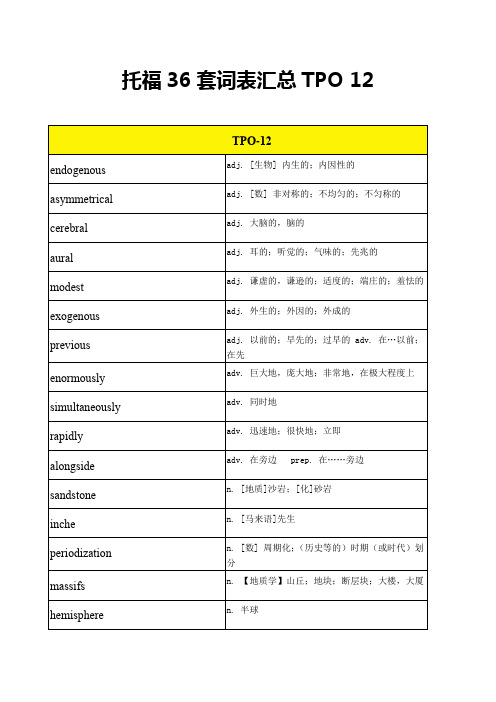
n.似非而是的论点;悖论,反论;自相矛盾的人或事
perspective
n.透视图;远景;观点adj.透视的
phenomenon
n.现象;奇迹;杰出的人才
crescent
n.新月;新月状物;伊斯兰教的标记;土耳其的新月形国徽
strain
n.张力;拉紧;vi.拉紧;尽力vt.拉紧;竭力
flake
vi.剥落;成片状剥落vt.将…剥落n.小薄片;火花
conglomerate
vi.凝聚成团n.砾岩;聚合物vt.凝聚成团
engrave
vt.雕刻;铭记
furnish
vt.供应;提供;装备
tap
vt.轻敲;轻打;vi.轻拍;轻击n.水龙头;轻打
revitalize
vt.使…复活;使…复兴;使…恢复生气
overshadow
vt.使阴暗;使失色;遮阴;夺去…的光彩
desert
vt.遗弃;放弃n.沙漠;荒原;adj.沙漠的;荒凉的
recharge
vt.再充电;再袭击n.再袭击;再装填vi.再袭击
sandstone
n. [地质]沙岩;[化]砂岩
inche
n. [马来语]先生
periodization
n. [数]周期化;(历史等的)时期(或时代)划分
massifs
n.【地质学】山丘;地块;断层块;大楼,大厦
hemisphere
n.半球
inadequacy
n.不适当,不充分;不完全;不十分
division
leak
n.漏洞,裂缝;泄漏vt.使渗漏,泄露vi.漏,渗
spiral
n.螺旋;旋涡;adj.盘旋的vt.使成螺旋形;
托福听力LECTURE学术词汇
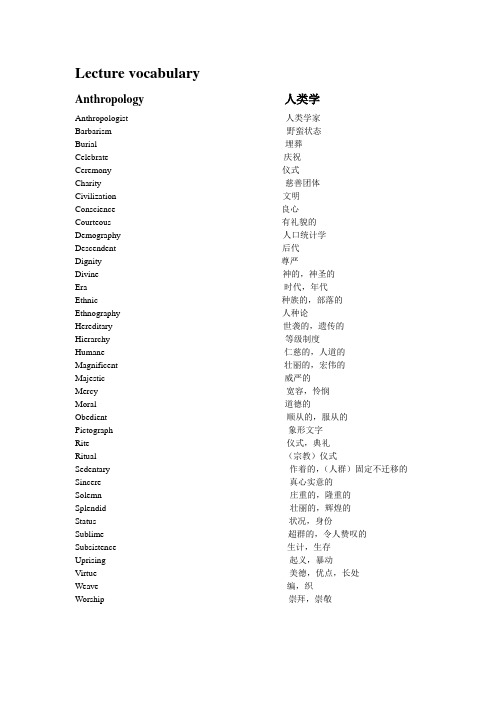
Lecture vocabularyAnthropology 人类学Anthropologist 人类学家Barbarism 野蛮状态Burial 埋葬Celebrate 庆祝Ceremony 仪式Charity 慈善团体Civilization 文明Conscience 良心Courteous 有礼貌的Demography 人口统计学Descendent 后代Dignity 尊严Divine 神的,神圣的Era 时代,年代Ethnic 种族的,部落的Ethnography 人种论Hereditary 世袭的,遗传的Hierarchy 等级制度Humane 仁慈的,人道的Magnificent 壮丽的,宏伟的Majestic 威严的Mercy 宽容,怜悯Moral 道德的Obedient 顺从的,服从的Pictograph 象形文字Rite 仪式,典礼Ritual (宗教)仪式Sedentary 作着的,(人群)固定不迁移的Sincere 真心实意的Solemn 庄重的,隆重的Splendid 壮丽的,辉煌的Status 状况,身份Sublime 超群的,令人赞叹的Subsistence 生计,生存Uprising 起义,暴动Virtue 美德,优点,长处Weave 编,织Worship 崇拜,崇敬Archaeology 考古学Aborigine 土著居民Animism 万物有灵论,泛灵论Artifact 人工制品,手工艺品Conservation 保存,保护Corpse 尸体Date 确定(或推定)。
的年代Excavate 挖出,发掘Extinct 灭绝的,绝种的Flourish 繁荣,兴旺Hominoid 人科的动物,类人动物Incise 雕Medieval 中古时期的,中世纪的Mural 壁画Prehistoric 史前的Preserve 保护,维持的Primeval 原始的Primitive 原始的,上古的Provenience 起源地,出处Radiocarbon dating 放射性碳年代测定Relic 遗迹,遗物Ruins (复数)废墟Specimen 标本Architecture 建筑学Abbey 大修道院,Antique 古董,古董的Arch 拱顶,拱形物Aisle 过道,通道Asymmetrical 不匀称的,不对称的Atrium (高楼大厦的)中庭,天井Blueprint 蓝图,计划Canopy 华盖Cellar 地下储藏室,地窖Column 柱,圆柱Crypt 教堂地下室Dome 圆屋顶Edifice 建筑(尤指宏伟的建筑)Engraving 雕刻工作Frame 框架,构架Landlord 房东Marble 大理石Monument 纪念碑Mosaic 马赛克Occupancy 占有,占用Pagoda 塔Patio 露台,平台Picturesque 生动的,风景如画的Pillar 柱子,房柱Property 财产,房地产Pyramid 金字塔Renovation 修复,装修Residence 居住,住宅Sanctuary 圣所,庇护所Spacious 宽敞的Spatial 空间的,关于空间的Specification 规格(说明),明细规范Sublime 超群的,令人赞叹的Symmetrical 对称的,匀称的Tenant 房客Urban 城市的Vault (教堂的)拱顶Zoning 分区制,分区布局Art 艺术Abstract 抽象的Abstract Expressionism 抽象表现主义Adorn 装饰Array 排列,陈列Artistic 艺术的Aspect 神态,面貌Authentic 真实的,可靠地Bead 水珠,珠子Carve 雕刻Cast 铸造Character 特征,性格Conspicuous 显眼的,显著地Counterfeit 防止,伪造,Craft 工艺,手艺Cubism 立体派(20世纪的一种艺术流派)Duplicate 复制Embed 把。
生词 Tpo12
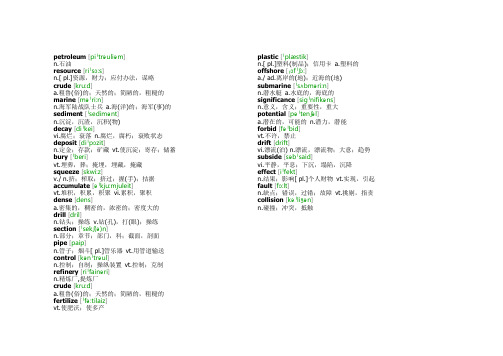
petroleum[piˈtrəuliəm]n.石油resource[riˈsɔ:s]n.[ pl.]资源,财力;应付办法,谋略crude[kru:d]a.粗鲁(俗)的;天然的;简陋的,粗糙的marine[məˈri:n]n.海军陆战队士兵a.海(洋)的;海军(事)的sediment[ˈsedimənt]n.沉淀,沉渣,沉积(物)decay[diˈkei]vi.腐烂;衰落n.腐烂,腐朽;衰败状态deposit[diˈpɔzit]n.定金;存款;矿藏vt.使沉淀;寄存;储蓄bury[ˈberi]vt.埋葬,葬;掩埋,埋藏,掩藏squeeze[skwi:z]v./ n.挤;榨取;挤过;握(手);拮据accumulate[əˈkju:mjuleit]vt.堆积,积累,积聚vi.累积,聚积dense[dens]a.密集的,稠密的,浓密的;密度大的drill[dril]n.钻头;操练v.钻(孔),打(眼);操练section[ˈsekʃ(ə)n]n.部分;章节;部门,科;截面,剖面pipe[paip]n.管子;烟斗[ pl.]管乐器vt.用管道输送control[kənˈtrəul]n.控制;自制;操纵装置vt.控制;克制refinery[riˈfainəri]n.精炼厂,提炼厂crude[kru:d]a.粗鲁(俗)的;天然的;简陋的,粗糙的fertilize[ˈfə:tilaiz]vt.使肥沃;使多产plastic[ˈplæstik]n.[ pl.]塑料(制品);信用卡a.塑料的offshore[ˌɔfˈʃɔ:]a./ ad.离岸的(地);近海的(地) submarine[ˈsʌbməri:n]n.潜水艇a.水底的,海底的significance[sigˈnifikəns]n.意义,含义;重要性,重大potential[pəˈtenʃəl]a.潜在的,可能的n.潜力,潜能forbid[fəˈbid]vt.不许,禁止drift[drift]vi.漂流(泊) n.漂流,漂流物;大意;趋势subside[səbˈsaid]vi.平静,平息;下沉,塌陷,沉降effect[iˈfekt]n.结果;影响[ pl.]个人财物vt.实现,引起fault[fɔ:lt]n.缺点;错误,过错;故障vt.挑剔,指责collision[kəˈliʒən]n.碰撞;冲突,抵触。
托福听力LECTURE学术词汇

Lecture vocabulary Anthropology人类学Anthropologist人类学家Barbarism野蛮状态Burial埋葬Celebrate庆祝Ceremony仪式CharityCivilizationConscienceCourteousDemographyDescendentDignityDivineEraEthnicEthnographyHereditaryHierarchyHumaneMagnificent MajesticMercyMoral Obedient PictographRiteRitual Sedentary SincereSolemn SplendidStatusSublime Subsistence UprisingVirtueWeaveWorship慈善团体文明良心有礼貌的人口统计学后代尊严神的,神圣的时代,年代种族的,部落的人种论世袭的,遗传的等级制度仁慈的,人道的壮丽的,宏伟的威严的宽容,怜悯道德的顺从的,服从的象形文字仪式,典礼(宗教)仪式作着的,(人群)固定不迁移的真心实意的庄重的,隆重的壮丽的,辉煌的状况,身份超群的,令人赞叹的生计,生存起义,暴动美德,优点,长处编,织崇拜,崇敬Archaeology考古学Aborigine土著居民Animism万物有灵论,泛灵论Artifact人工制品,手工艺品Conservation保存,保护Corpse尸体Date确定(或推定)。
的年代Excavate挖出,发掘ExtinctFlourishHominoidInciseMedievalMuralPrehistoric Preserve Primeval Primitive Provenience Radiocarbon dating RelicRuinsSpecimen Architecture AbbeyAntiqueArchAisle Asymmetrical AtriumBlueprint CanopyCellarColumnCryptDomeEdificeEngravingFrameLandlord灭绝的,绝种的繁荣,兴旺人科的动物,类人动物雕中古时期的,中世纪的壁画史前的保护,维持的原始的原始的,上古的起源地,出处放射性碳年代测定遗迹,遗物(复数)废墟标本建筑学大修道院,古董,古董的拱顶,拱形物过道,通道不匀称的,不对称的(高楼大厦的)中庭,天井蓝图,计划华盖地下储藏室,地窖柱,圆柱教堂地下室圆屋顶建筑(尤指宏伟的建筑)雕刻工作框架,构架房东Marble大理石Monument纪念碑Mosaic马赛克Occupancy占有,占用Pagoda塔Patio露台,平台Picturesque生动的,风景如画的Pillar柱子,房柱Property财产,房地产Pyramid Renovation Residence SanctuarySpaciousSpatial Specification Sublime SymmetricalTenantUrbanVaultZoningArtAbstractAbstract Expressionism AdornArrayArtisticAspectAuthenticBeadCarveCastCharacter Conspicuous CounterfeitCraftCubismDuplicateEmbedEminent金字塔修复,装修居住,住宅圣所,庇护所宽敞的空间的,关于空间的规格(说明),明细规范超群的,令人赞叹的对称的,匀称的房客城市的分区制,分区布局艺术抽象的抽象表现主义装饰排列,陈列艺术的神态,面貌真实的,可靠地水珠,珠子雕刻铸造特征,性格显眼的,显著地防止,伪造,工艺,手艺立体派(20世纪的一种艺术流派)复制把。
托福听力TPO12原文 Lecture 3-智课教育旗下智课教育
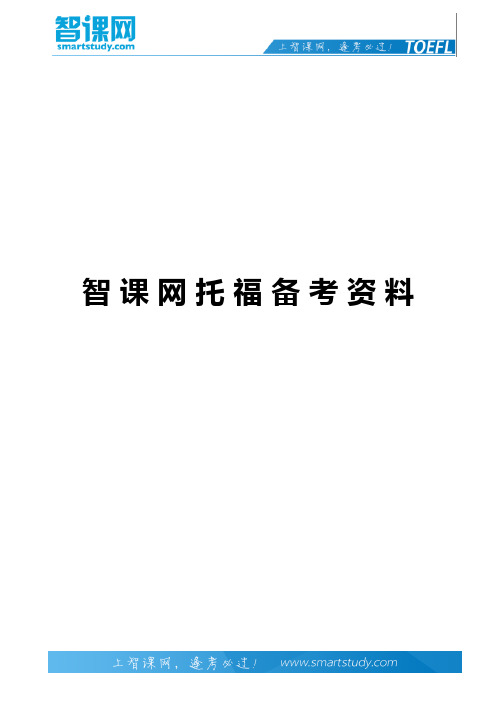
智 课 网 托 福 备 考 资 料托福听力TPO12原文 Lecture 3-智课教育旗下智课教育下面就让小编来为大家介绍一下托福听力TPO12原文中Lecture 3的文本内容吧,大家要好好把握,这些都是非常有价值的材料,同时,大家也可以登录智课教育论坛进行TPO练习辅导,希望能够给准备托福听力的同学带来帮助。
TPO 12 Lecture 3 Music historyProfessor:The word opera means work, actually it means works. It’s the plural of the word opus from the Latin. And in Italian it refers in general to works of art. Opera Lyric or lyric of opera refers to what we think of as opera, the musicaldrama.Opera was commonplace in Italy for almost thousands of years before it became commercial as a venture. And during those years, several things happened primarily linguistic or thematic and both involving secularization.Musical drama started in the churches. It was an educational tool. It was used primarily as a vehicle for teaching religion and was generally presented in the Latin, the language of the Christian Church which had considerable influence in Italy at that time. But the language of everyday life was evolving in Europe and at a certain point in the middle ages it was really only merchants, Socratics and clergy who can deal with Latin. The vast majority of the population used their own regional vernacular in all aspects to their lives. And so in what is now Italy, operas quit being presented in Latin and started being presented in Italian. And once that happened, the themes of the opera presentations also started to change. And musical drama moved from the church to the plaza right outside the church. And the themes again, the themes changed. And opera was no longer about teaching religion as it was about satire and about expressing the ideas of society your government without committing yourself to writing and risking imprisonment or persecution, or what have you.Opera, as wethink of it, is of course a rather restive form. It is the melodious drama of ancient Greek theater, the term ‘melodious drama’being shortened eventually to ‘melodrama’ because operas frequently are melodramatic, not to say unrealistic. And the group that put the first operas together that we have today even, were, they were…well…it was a group of men that included Gallo Leo’s father Venchesil, and they met in Florence he and a group of friends of the counts of the party and they formed what is called the Camarola Dayir Bardy. And they took classical theater and reproduced it in the Renaissance’s time. This…uh…this produced some of the operas that we have today.Now what happened in the following centuries is very simple. Opera originated in Italy but was not confined to Italy any more than the Italians were. And so as the Italians migrated across Europe, they carried theater with them and opera specifically because it was an Italian form. What happened is that the major divide in opera that endures today took place. The French said opera auto-reflect the rhythm and Kevin of dramatic literature, bearing in mind that we are talking about the golden age in French literature. And so the music was secondary, if you will, to the dramatic Kevin of language, to the way the rhythm of language was used to express feeling and used to add drama and of course as a result instead of arias or solos, which would come to dominated Italian opera. The French relied on that what is the Italian called French Word 1 or French Word 2 in English. The lyrics were spoken, frequently to the accomp**nt of a harpsichord.The French said you really cannot talk about real people who lived in opera and they relied on mythology to give them their characters and their plots, mythology, the past old traditions, the novels of chivalry or the epics of chivalry out of the middle Ages. The Italian said, no this is a great historical tool and what a better way to educate the public about Neo or Attallaor any number of people than to put them into a play they can see and listen to. The English appropriated opera after the French. Opera came late to England because alltheaters, public theaters were closed, of course, during their civil war. And it wasn’t until the restoration in 1660 that public theaters again opened and opera took off. The English made a major adjustment to opera and exported what they had done to opera back to Italy. So that you have this circle of musical influences, the Italians invented opera, the French adapted it, the English adopted it, and the Italians took it back.It came to America late and was considered to elites for the general public. But Broadway musicals fulfilled a similar function for a great long while. George Champon wrote about opera, “If an extraterrestrial being or two appear before us and say, what is your society like, what is this Earth thing all about, you could do worse than take that creature to an opera.” Because opera does, after all, begin with a man and a woman and any motion.《音乐史》教授:“歌剧”这个词的意思是“作品”。
TPO-12 听力解析(Lecture3-Opera)

TPO-12 Lecture3 Music History(Opera)要点归纳及讲座层次黄晓红 2010年12月Opera一词的来历和含义一、歌剧发展的初期:(1)最初:主要在教堂;作为传播宗教的手段;拉丁语形式。
然而,在中世纪的欧洲:日常用语产生,只有少数商人、贵族和牧师懂得拉丁语,大部分人用方言交流。
影响-->(2)歌剧发生变化:歌剧语言:开始用意大利语演唱,歌剧的主题也随之改变。
歌剧的主题:不再作为传播宗教的工具,而被用来表达对社会的看法。
二、歌剧的前身:古希腊戏剧;歌剧通常具有戏剧性、不切实际巴尔迪伯爵和他的朋友们的贡献:在文艺复兴时期,把古典戏剧改造为歌剧三、歌剧的传播概述:歌剧起源于意大利,但正如意大利人一样,它并没有被局限在那里。
歌剧随着意大利人的迁移而被传播到欧洲的各个地方。
1、歌剧内部分化的出现:(法国歌剧和意大利歌剧侧重点不同)(1)法国歌剧:认为歌剧应当反应戏剧文学的韵律和节奏;因此法国歌剧把音乐的重要性置于音韵优美的语言(表达情感,增加戏剧性)之后。
(2)因此,尽管咏叹调和独唱后来占据了意大利歌剧的一席之地;法国人依赖于采用吟诵调(歌词被朗诵出来,通常由大提琴伴奏)。
(3)在内容上:法国人还认为在歌剧中不能谈论现实人物,他们从神话故事中寻找可以用于歌剧创作的人物和情节。
(神话,田园牧歌传统,骑士小说,中世纪的骑士史诗)(4)意大利人则认为歌剧是最好的历史工具,可以用来教导公众,歌颂尼罗(古罗马皇帝)或者匈奴王的功绩。
2、英国继法国之后改造歌剧,然后又向意大利输出歌剧。
3、歌剧传播到美国比较晚,并且被看作是脱离大众的精英文化。
百老汇音乐剧扮演了和歌剧相似的角色。
小结:音乐影响的循环——意大利人发明了歌剧,法国人修改了歌剧,英国人吸收了歌剧,意大利人又回收歌剧。
四、引言及评价关于歌剧,John Jay Chapman写道,【引言】“如果一个或两个外星人出现在我们面前,问:你们的社会是什么样的,地球到底是个什么东西。
【可打印】托福听力 熟词僻义
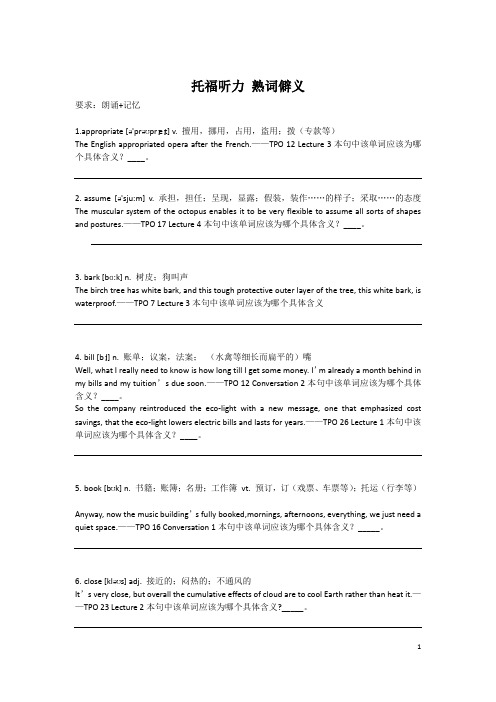
托福听力熟词僻义要求:朗诵+记忆1.appropriate [ə'prəʊprɪeɪt] v. 擅用,挪用,占用,盗用;拨(专款等)The English appropriated opera after the French.——TPO 12 Lecture 3本句中该单词应该为哪个具体含义?____。
2.assume [ə'sju:m] v. 承担,担任;呈现,显露;假装,装作……的样子;采取……的态度The muscular system of the octopus enables it to be very flexible to assume all sorts of shapes and postures.——TPO 17 Lecture 4本句中该单词应该为哪个具体含义?____。
3.bark [bɑ:k] n. 树皮;狗叫声The birch tree has white bark, and this tough protective outer layer of the tree, this white bark, is waterproof.——TPO 7 Lecture 3本句中该单词应该为哪个具体含义4.bill [bɪl] n. 账单;议案,法案;(水禽等细长而扁平的)嘴Well, what I really need to know is how long till I get some money. I’m already a month behind in my bills and my tuition’s due soon.——TPO 12 Conversation 2本句中该单词应该为哪个具体含义?____。
So the company reintroduced the eco-light with a new message, one that emphasized cost savings, that the eco-light lowers electric bills and lasts for years.——TPO 26 Lecture 1本句中该单词应该为哪个具体含义?____。
